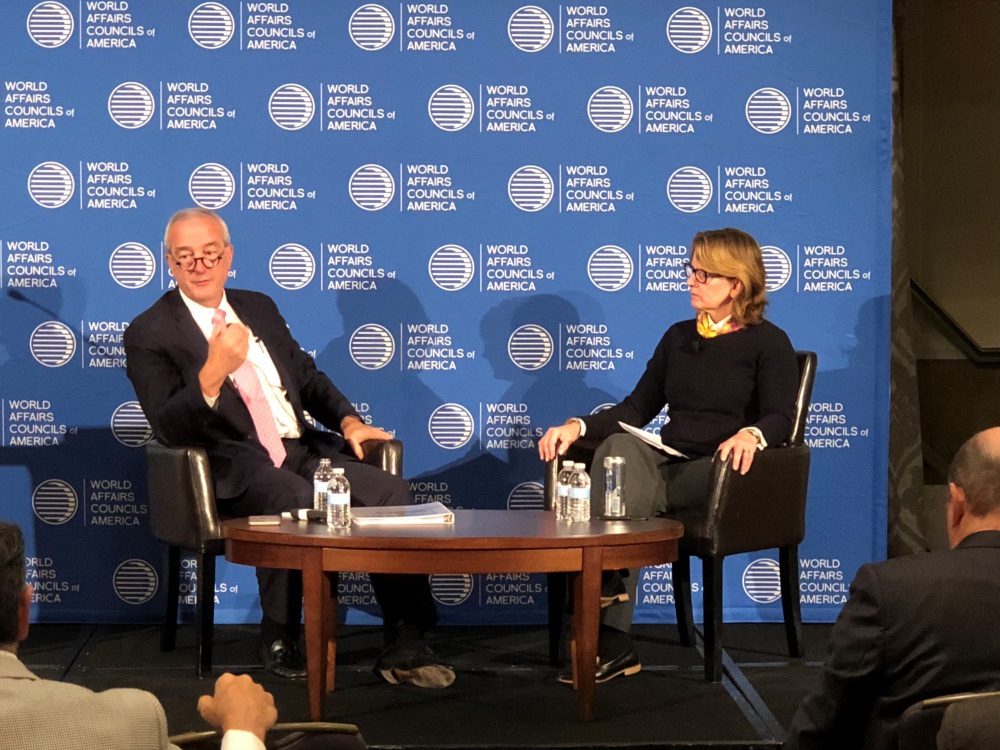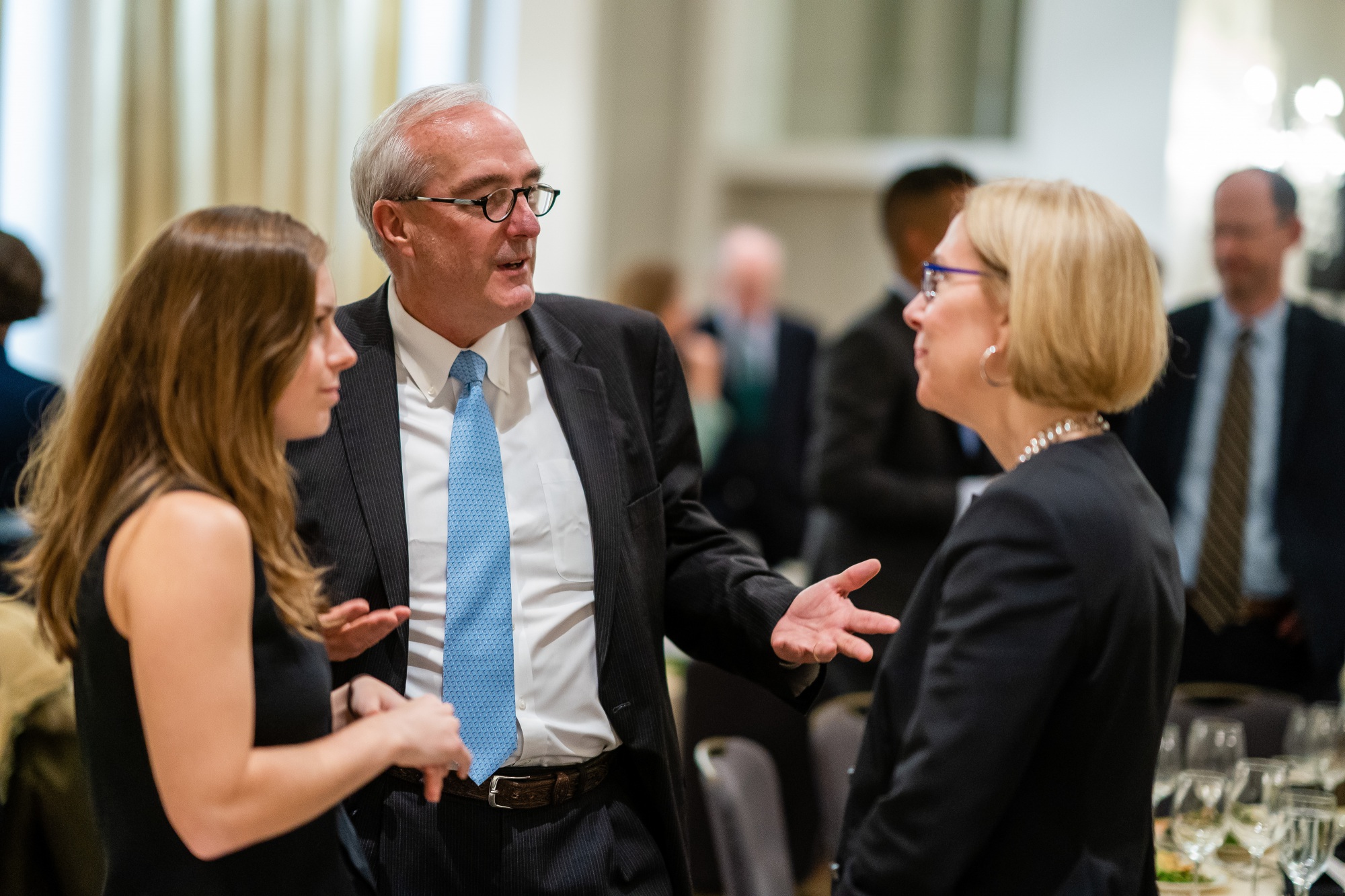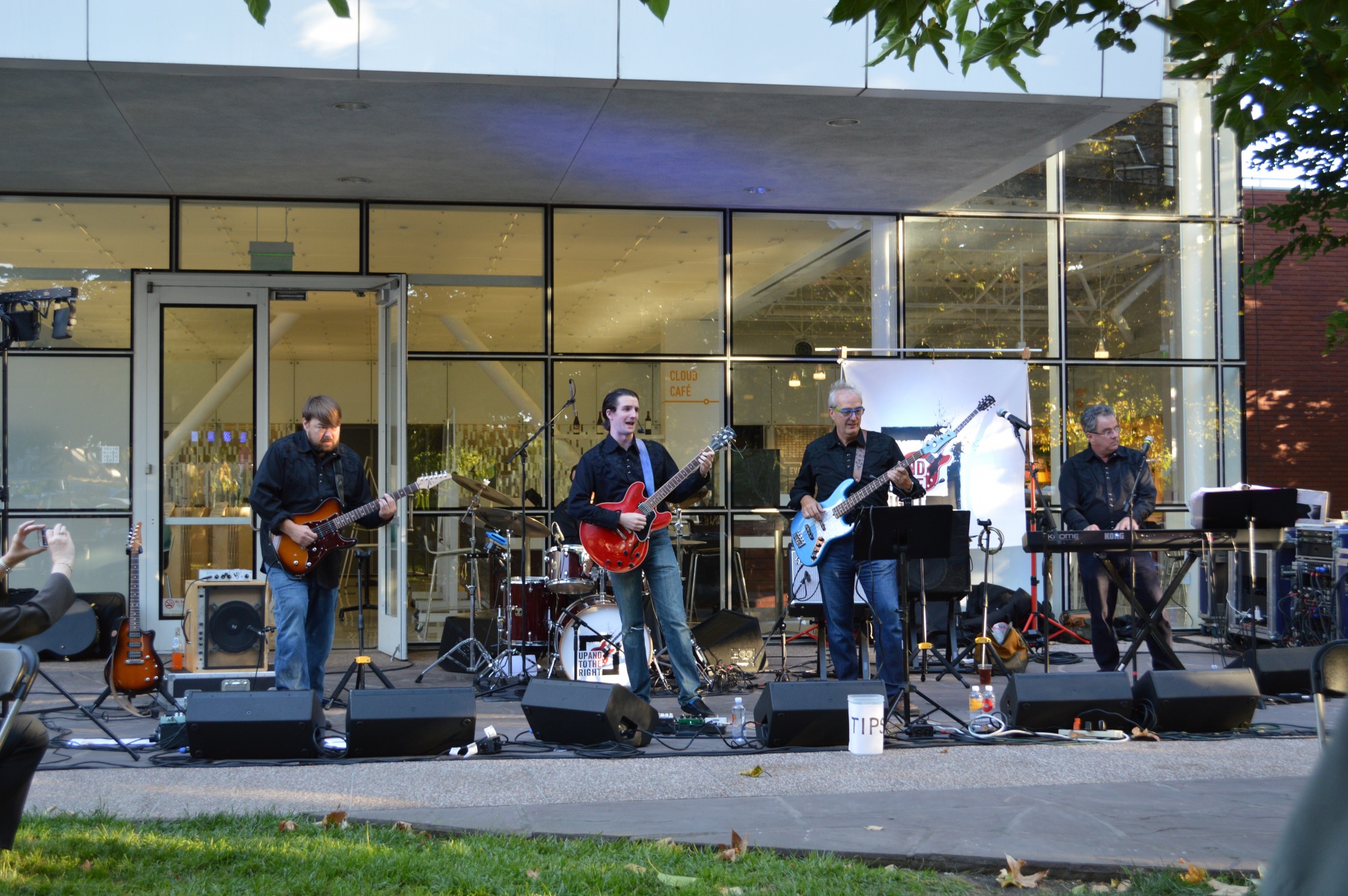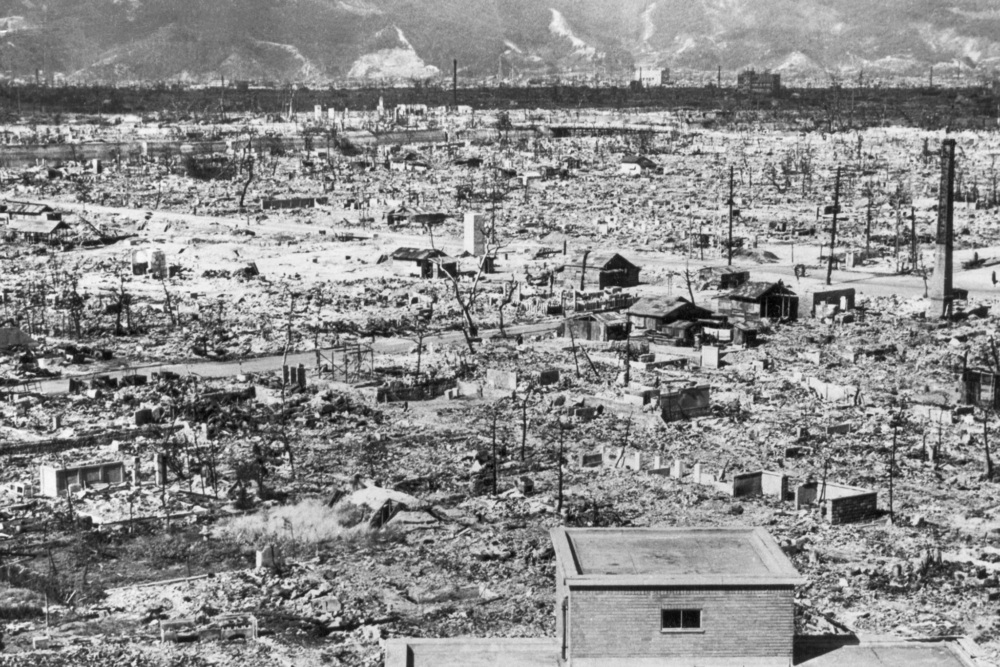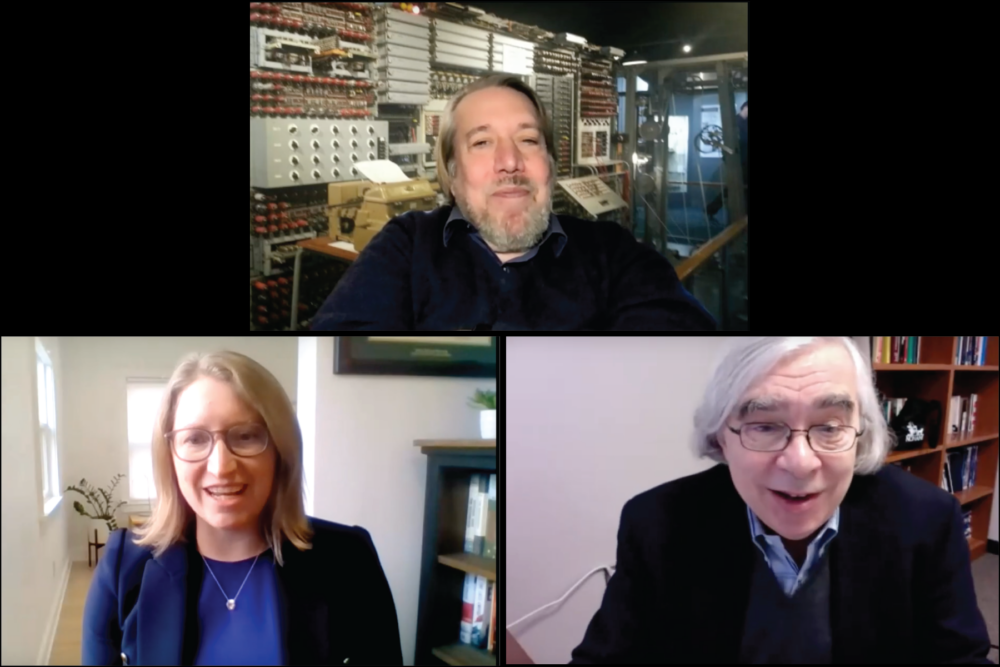
Mimi Hall
Vice President, Communications
Atomic Pulse
Ray
Rothrock is a member of NTI’s Board of Directors and its
Science and Technology Advisory Group. He has
three decades of business leadership—investing in, advising and leading many of
the technology and cybersecurity companies that form the fabric of today’s
networks. He is partner emeritus at Venrock, the VC arm of the
Rockefeller family’s efforts, and the CEO and chairman of RedSeal, which
provides critical cyber and business insights via its cyber risk modeling
platform to more than 50 government agencies and hundreds of commercial
enterprises. Rothrock holds a BS in Nuclear Engineering
from Texas A&M University, a MS in Nuclear Engineering from the
Massachusetts Institute of Technology, and a MBA with Distinction from the
Harvard Business School. He is author of Digital
Resilience: Is Your Company Ready for the Next Cyber Threat?
You’re probably best known, at least recently,
as an expert on cybercrime and cyber security, right? But you also have a
background in nuclear engineering. So, you could have spent your career in a
nuclear sub under the sea.
Not
quite. It turns out that I’m color blind
enough that Admiral Rickover wouldn’t have me in his fleet.
Oh, wow.
So, I went
the civilian route. And I did spend five years in the industry and a year and a
half at a (nuclear) plant. Yankee Rowe in Massachusetts. It was back in the
late ’70s.
So the combination of your backgrounds
in cyber security and nuclear engineering, I assume, is what led you to NTI?
Yes, I mean,
I was a nuclear engineer for five years. I actually got my professional certification. The Three Mile Island (the accident involving
the partial meltdown of a reactor and radiation release at a nuclear plant in
Pennsylvania in 1979) had its impact on the nuclear power industry, which
looked like it was hunkering down. So, just
as the nuclear industry took this not-quite-fatal hit, the PC was born and the
Apple II computer came on the market. I bought one of those silly little
things. I say silly little thing, but it
had a massive impact on our world.
And then I
moved to the Silicon Valley and landed there in 1981 when the whole Silicon
Valley thing was just starting to happen. So, I made a very conscious decision
to get involved in this emerging personal computer industry, while somehow
keeping the bills paid with nuclear engineering consulting and what have you.
How did that go?
I did three
start-up companies. The first two were nuclear
engineering software companies, and they ultimately failed, one very
dramatically, and I finally landed at a new company called Sun Microsystems,
which was venture backed. So it was at
Sun, I was introduced to venture capital (VC).
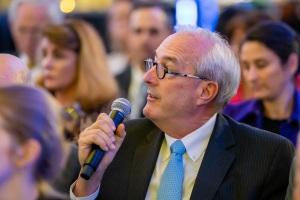
After success at Sun, I went to business school
intended to get into VC. In those days, that was the union card, so to speak,
that you had to punch to get into VC, it was a very small industry. So, I went to Harvard, and I took a position at Venrock. I was there for 25 years.
At Venrock I invested
in infrastructure for hard things, hard technical things, and I taught myself a
lot about computers, networking, and all the infrastructure. … And one of the
concepts that I was taught as a young associate at Venrock was, you want to
look for opportunities that aren’t just one-off opportunities but in fact lead
to subsequent opportunities and that’s what the Internet turned into, right?
So I became
quite interested in cyber security and cyber threats.
How so?
As the Internet
happened, as companies connected into the Internet, bad guys appeared on the
scene and new threats appeared. I managed
to get connected with the entrepreneurs who ultimately created the leading company
to address that new threat with a firewall technology. Eventually, there were, I don’t know, there
were probably 10 of us in Silicon Valley who did all of the cyber deals. … And
we’re still doing them and we’re still killing it because the threats are never
ending.
In 2013, I retired
from Venrock—and I thought I was really going to retire. But then one of the
cyber deals that I invested in got itself in trouble. I was a big believer in it, so I was asked to
become the CEO and hoped to kind of, you know, as we used to say the venture
business, clean it up, knock out the dents, put a fresh coat of paint on it,
and maybe find a home for it. But instead what I found was some incredible technology
that could address what I saw as a new emerging threat. This new threat was exhibited by the Target
attack—the Target Corporation attack in 2013.
We all remember that one.
Right. So here’s
a great company—Target, a Fortune 50, lots of software, lots of engineers,
sufficient budget—and it got hacked and hacked bad. Why? Every good engineer would ask, why? Why did that company get hacked? And come to find out, the bad stuff, the
malware was inside the network, not an attack from the outside. And as I began to investigate, Sony, JPMorgan,
Home Depot, the U.S. government, just suddenly the whole world was being
attacked in similar ways, and it’s all front page news.
So that
inspired me to think about that problem and how it got in. And if you assume it’s in, what do you do
about it? Firewalls aren’t going to keep
everything out anymore, data leak isn’t keeping it in, all this stuff that was
about prevention and detection worked to a degree, but it wasn’t perfect. So,
this concept of digital resilience crept into my head after reading a bunch of
books by McKinsey and Rodin. So I decided
to write a book about this idea, it’s called Digital Resilience, and I think that’s what really cemented my
cyber expertise if you will.
How did you end up working with NTI?
I’ve known (NTI
Co-Chair and CEO) Secretary Moniz for many years as I’m on the board of MIT
among connections. He of course finishes
his tour as Energy Secretary and lands here at NTI. As cyber became an issue related to NTI’s
mission, Ernie gave me a call and said, “Hey, would you consider coming
and help us here and think about how to frame cyber in the context of nuclear
weapons?” And how can you say no to Ernie?
Can you talk a little bit about how
serious and urgent a concern cyber threats are to our nuclear infrastructure, both
nuclear facilities and weapons command and control? I mean, attacks on Target and other
businesses are not trivial. They can
impact global economies. But nuclear—that’s a whole different ballgame.
There’s no
question, it’s a very serious and urgent matter. Nothing is perfect, and if a hacker really
wants in, they will figure out how to get in to do something. My dad taught me as a little boy, locks keep
honest people honest. The harder the lock, the more intrusion it will prevent. But every lock is breakable …
Do I think
someone wants to launch a weapon or detonate a weapon in silo or something like
that? No, I don’t think that’s the state
of play and besides that’s probably very hard to do. What I do think the state of play is to
weaken the trust that we have in our systems that manage and control not just
the weapons, but the decision framework for use. And if we weaken the trust and then create a
threat, do the people believe the threat is contained? It’s more about the terror concept of it more
than the actual physical event of it.
You could use
cyber to create an incredible deception. NORAD’s (North American Aerospace
Defense Command) had several false flags in its history. You know the movie WarGames with Matthew Broderick? Think about when that came out (in
1983), and I was like, that could happen tomorrow. There also is a great, a fictional book
called Ghost Fleet in which there is an
attack on the United States by China in 2024 or something like that. Before the attack they used cyber to disable
our defensive systems so that a kinetic attack would work preventing or
blunting a U.S. response. The Ghost
Fleet refers to all of the old weaponry airplanes and ships that are not
dependent on computers and that is what the US grabs and use. We bring those
out to defend against the Chinese.
So, given your perspective on where
the real threat lies, can you talk a little bit about what you think our
government and governments should be doing and what kind of role you think NGOs
can play? What kind of a role can NTI
play to address this threat?
Well, I think
a key thing to addressing the threat is to share what those threats are—and NTI
is right in the middle of this conversation. It’s about transparency and data sharing. During the Obama Administration, I was
involved in the writing of several bills originating in the Senate that tried
to come up with data-sharing plans and policies. None of it ever got off the ground because
the commercial sector doesn’t trust the government to keep the data safe, and lo
and behold, they were right. The government can’t keep it safe. So, there are
serious questions about who owns the data and who’s got the keys. It’s a real
standoff, but we’re going to have to have a policy of data sharing and threat
sharing and ultimately response sharing.
Transparency is key.
Before you go, can I ask you a little
bit about what you do in your spare time, if you have any, when you’re not
worrying about trying to address these kinds of threats?
Well, music
certainly is something I do. I became a
musician beginning in the 4th grade. I
learned to play the clarinet, and I played woodwinds all the way through
college and then got busy with life. And then along came my son in 1990. He went to Middlebury and got a music and theater
degree. And when he finished college, he moved back to California to go professional
theater. We formed a rock band, Up and to
the Right. He is the lead singer and I’m
the bass player.
He lives in
New York now, but when we have a gig, he flies out. He’ll show up the night
before, we’ll have a rehearsal, and he, I mean, he can walk on the stage and
just kill it.
The band is called Up and to the
Right. What does the name mean? Where
did that name come from?
Oh, I’m so
glad you asked! So, at Venrock, I spent 10 years in New York City. Wall Street has its own vocabulary, and I
learned a lot of that vocabulary. So, if
you think about financial graphs, time is on the X-axis and other things are on
the Y-axis, stock price, profits, revenue, market share, etc., and a good graph
is one that’s going up and to the right because that means things are getting
better.
And so, when
I moved to California, I sort of showed up in the venture capital role there
with a lot of New York-Wall Street slang, and people didn’t know what “up and
to the right” was, and I used it a lot. So
that’s the source. It was very catchy, and so when the band formed, we used Up and
to the Right.
I bet you have a lot of fun with the
band. That’s like a father’s dream, I think, to get to play in a band with your
son.
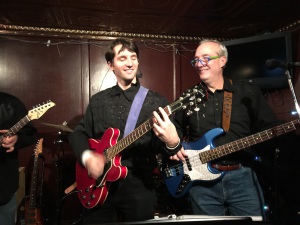
It is. You
know, one of my mentors told me, he said, you know, when you have children
someday, you’ll try to force them into things you like. Think about it, flip it around. Do what they like, and you’ll have a better
relationship. That mentor was right.
That’s fantastic.
The other
thing I do is emergency preparedness in my town. I’m the ham radio guy, I have
been for 45 years. And I’m an engineer, so I’m actually quite good with my
hands, and I can fix things and stuff. So,
I run the communications network that we have in town. I’ve been doing it for
20 years this month, and with all the power outages we had lately, all the
preparation has paid off in spades.
That’s very rewarding, right? At the
local level you can really see the results of your efforts. That’s cool.
Yeah. And we
also put up a broadcast, radio station.
It’s just putting out emergency information, and so we got a call from
the town manager yesterday before I flew out here (to the NTI Board meeting). He says, this is great – what else can we
do? So, you know, I get to spend the
taxpayers’ money to serve them.
And then – from small-town
preparedness, you fly to Washington and talk about nuclear threats.
Right! So that’s
what I do for fun. And then, of course, my wife Meredith and I, we play golf
and travel a bit. I have a great family.
Sign up for our newsletter to get the latest on nuclear and biological threats.
Artificial Intelligence has many potential applications and consequences for strategic risk. Here is NTI’s work on it so far.
The bombings of Hiroshima and Nagasaki in 1945 made clear the destructive force of the light, heat, blast, and radiation from a nuclear explosion. But what exactly would the effects of a nuclear explosion mean for the world today?
What happens “if we can’t rely on the information we have,” asks Christopher Painter, former top U.S. cyber diplomat. In an NTI seminar on January 25, Painter posed this critical question and discussed a range of issues at the intersection of cyber and nuclear security.
